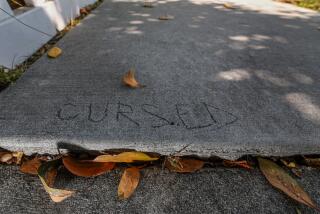. . . to Solve Problems With Your Neighbors
- Share via
SAN DIEGO — How do you deal with a neighbor whose dog barks all night? How can you encourage the college students next door to lower the volume on their stereo in the early morning? How can you protect your plants from a soaking by an overzealous neighbor’s sprinklers?
Sometimes settling a dispute with a neighbor is simply a question of asking nicely. Other times, it’s necessary to call in some outside assistance. How do you lodge a complaint against a neighbor? And if someone lodges a complaint about you, how can you settle the problem before fists begin to fly?
City and county departments handle the most common neighborhood complaints: litter, abandoned cars, zoning violations, health problems, planning enforcement. The phone numbers are listed in the government section of the White Pages. To file a complaint, you can call the offices directly or pick up a complaint form at any public library and mail it in. Every department handles complaints differently.
Frank Hafner, San Diego’s noise abatement administrator and code enforcement team supervisor, says when the noise abatement department receives a complaint, it sends a notice that day to the accused person.
“In 52% of the cases,” he said, “the neighbors solve their differences. If the problem continues, we’ll send a second, delicately worded notice that informs the neighbor that we will send an investigator if the problem persists.”
Barking dogs, Hafner said, are one of the most serious problems in San Diego. Of the 9,000 complaints he receives each year, 60% are caused by canines. A field investigator often can pinpoint what is causing the dog to make noise and advise its owner. Seventy-nine percent of the cases end with the field investigation. If the problem still isn’t resolved, the case can go to a public hearing or, in a worst-case scenario, the city attorney’s office.
If your plight involves several city departments and you don’t know where to start, or if the department you contact seems to give you the bureaucratic runaround, call the citizen’s assistance office in the city manager’s office.
George Story, director of citizen’s assistance and public information, said his office is responsible for investigating complaints and routing them to the correct city, county or state office or other government agency.
“I ask questions,” he said, “until all the questions are answered and addressed.”
Problems that involve public property or an infringement of the civil code can be handled by public agencies, Story said. Neighborhood complaints involving private property--for example, a neighbor refusing to cut down trees that are obscuring the ocean view next door--often can’t be as easily solved. In disputes that could involve financial losses, he recommends bringing an action in Small Claims Court.
For example: Your neighbor insists on watering his lawn daily. Despite your friendly warnings, he repeatedly floods your new plants that require watering about twice a month. In situations like this, Story said, you should first discuss the problem with your neighbor and try to work out a solution.
If that fails, you should send a certified letter or a Mailgram informing the neighbor that he is damaging the plants which will cost, say, $100 to replace. Warn him that if the flooding continues you will take legal action. Take photographs of the wilting plants and gather other information to back up your case. If the plants die, Story said, bring action in Small Claims Court to recover your financial loss.
If a neighbor accuses you unjustly of some transgression, you should send a certified letter or a Mailgram to the neighbor explaining your position--you only water the lawn once a week but if that is causing problems you will take measures to improve the situation, Story said. Then start gathering evidence to build your defense and be prepared to meet your neighbor in court if he pursues the case.
Another, often more-effective alternative is the use of neighborhood mediation centers, which are in Golden Hill and Mira Mesa.
These centers serve without charge all communities in the county. They were founded by the University of San Diego School of Law and the San Diego County Bar Assn. to resolve disputes--outside of court--between neighbors, friends, relatives, youths, landlords and tenants, merchants and consumers, and employees and employers.
Mediation is a voluntary process that requires both parties to participate. One person simply calls either the Mira Mesa (578-2460) or Golden Hill (238-1022) center about the conflict; the staff at the center will contact the other party involved. If both agree to mediation, a structured, two-hour session with a trained mediator is arranged. The mediator will listen to both participants and help them work out a solution. The mediator does not judge who is right or wrong, but might write down the agreement the two people settle on and ask them to sign it.
In 90% of the cases, the disputants resolve their differences, said Sharon Schultze, director of the Mira Mesa/Scripps Ranch Mediation Center. Occasionally, she said, the disputants simply agree to disagree and hammer out ways to not see each other or communicate directly.
Schultze said many of the centers’ cases are referred from city officials like Frank Hafner and George Story, as well as City Council offices, schools or Neighborhood Watch. Parents and teen-agers have even worked out curfews at the center.
“Dispute and conflict are a fact of life,” Schultze said, “but we try to teach people skills to deal with them.”
Want to know how something works or how to get something done? Send queries to Clare White, The Los Angeles Times San Diego County Edition, 701 B St., Suite 501, San Diego 92101. Personal replies are not possible, and please do not phone.
More to Read
Sign up for Essential California
The most important California stories and recommendations in your inbox every morning.
You may occasionally receive promotional content from the Los Angeles Times.










